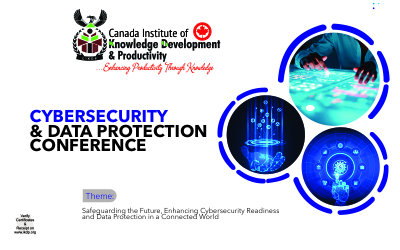Course description
INTRODUCTION
As digital transformation accelerates across every industry, organizations face increasing risks related to cyber threats, data breaches, and information security vulnerabilities. From sophisticated ransomware attacks to insider threats and data leaks, the need for a robust cybersecurity posture and effective data protection frameworks has never been more critical.
This international conference is designed to equip leaders, IT professionals, and compliance officers with cutting-edge knowledge and practical strategies to safeguard digital assets, ensure regulatory compliance, and build cyber resilience. Participants will explore global standards, best practices, and emerging technologies in cybersecurity—ranging from network defense and endpoint protection to data encryption, governance, and incident response.
In a world driven by data, protecting personal, financial, and institutional information is not just a technical concern but a strategic imperative. This course will empower professionals to anticipate cyber threats, develop security policies, and lead the way in creating trusted digital environments.
By the end of this conference, Participants will be able to:
- understand the evolving landscape of cybersecurity threats and trends;
- develop and implement cybersecurity strategies and risk management plans;
- protect sensitive data in compliance with global privacy laws and frameworks;
- create incident response and disaster recovery procedures;
- leverage cybersecurity tools, standards, and frameworks for threat mitigation;
- promote a culture of cyber awareness and organizational resilience; and
- understand roles of governance, compliance, and legal frameworks in data protection
CONFERENCE MODULES:
Module 1: Fundamentals of Cybersecurity and Threat Landscape
- Types of cyber threats: malware, phishing, ransomware, DDoS attacks
- Understanding threat actors and cyberattack vectors
- Overview of cybersecurity frameworks (NIST, ISO 27001)
- Cyber risk assessment and business impact analysis
Module 2: Data Protection and Privacy Regulations
- Data classification and lifecycle management
- Principles of data protection and privacy-by-design
- Compliance with GDPR, NDPR, and international data protection laws
- Data breach notification and response requirements
Module 3: Cyber Defense Strategies and Security Tools
- Network security and endpoint protection
- Encryption, firewalls, and intrusion detection systems (IDS)
- Cloud security and securing remote work environments
- Multi-factor authentication and access controls
Module 4: Incident Response and Crisis Management
- Building an incident response team (IRT)
- Cyber incident response plans (CIRP) and playbooks
- Post-incident reviews and forensic investigation basics
- Business continuity and disaster recovery planning
Module 5: Cybersecurity Governance and Culture
- Cybersecurity awareness and training programs
- Role of leadership in building cyber resilience
- Developing security policies and acceptable use policies
- Cybersecurity metrics, audits, and reporting
WHO SHOULD ATTEND:
- Chief Information Security Officers (CISOs)
- IT Managers and Network Administrators
- Data Protection Officers and Compliance Managers
- Risk and Governance Professionals
- Government Regulators and Policy Makers
- Legal and Audit Personnel
- Public Sector ICT Directors
- Financial and Healthcare IT Leaders
- NGO and Private Sector Digital Teams
- Academic Researchers and Consultants in Cybersecurity
What will i learn?
- Understand the evolving landscape of cybersecurity threats and trends;
- Develop and implement cybersecurity strategies and risk management plans;
- Protect sensitive data in compliance with global privacy laws and frameworks;
- Create incident response and disaster recovery procedures;
- Leverage cybersecurity tools, standards, and frameworks for threat mitigation;
Requirements
- June 30 - July 4, 2025. August 18-22, 2025 September 1-5, 2025 November 17-21, 2025 December 15-19, 2025 January 12-16, 2026
Frequently asked question


















